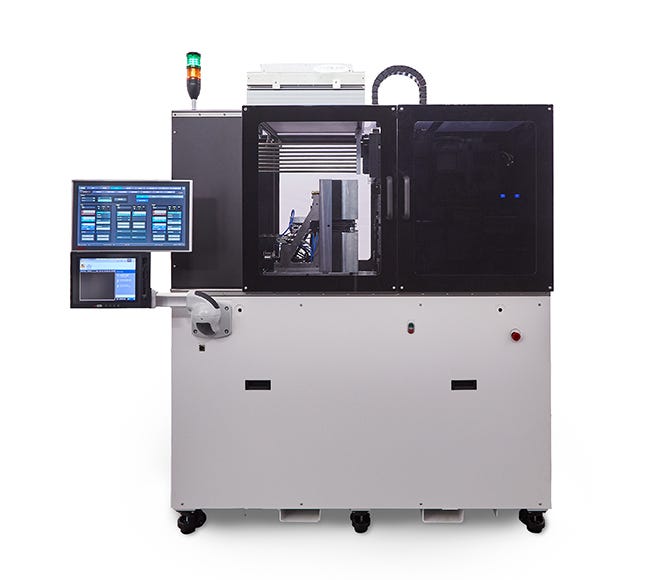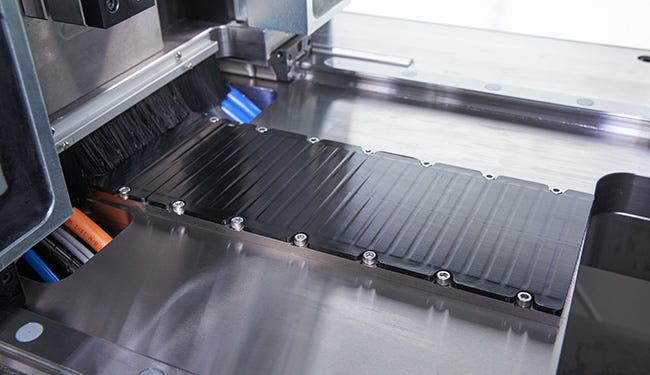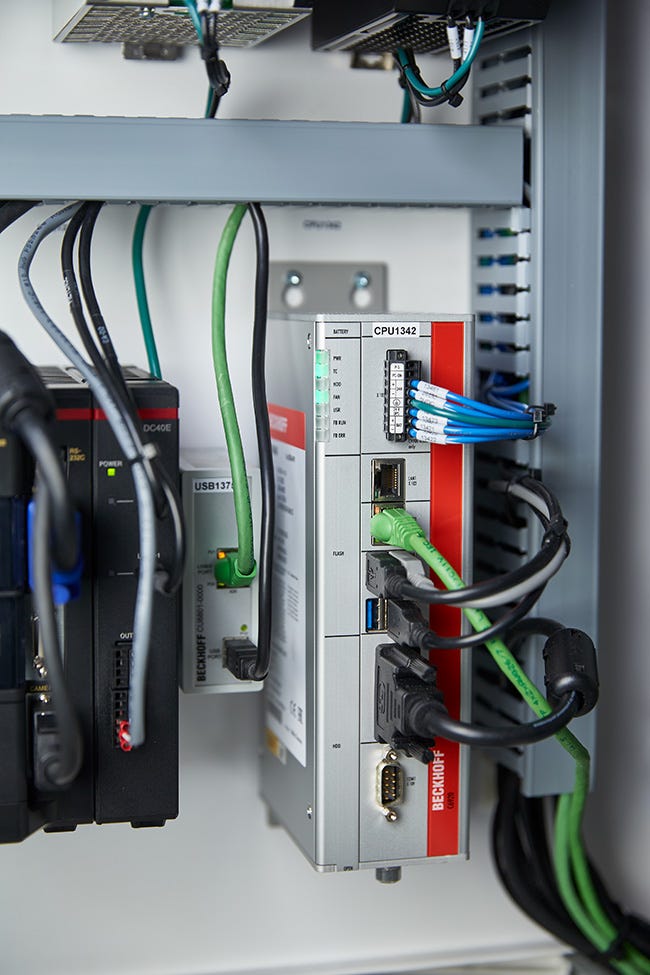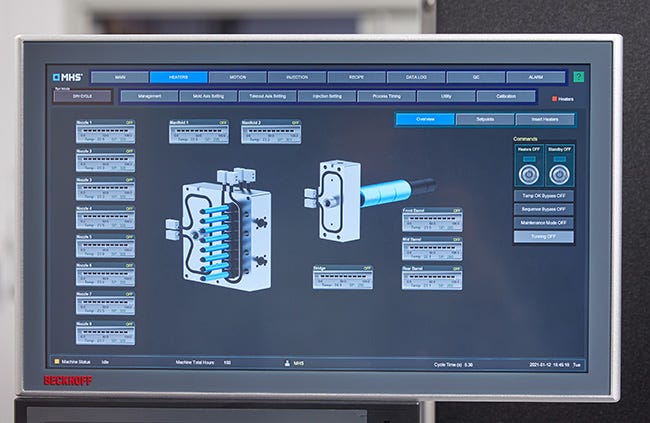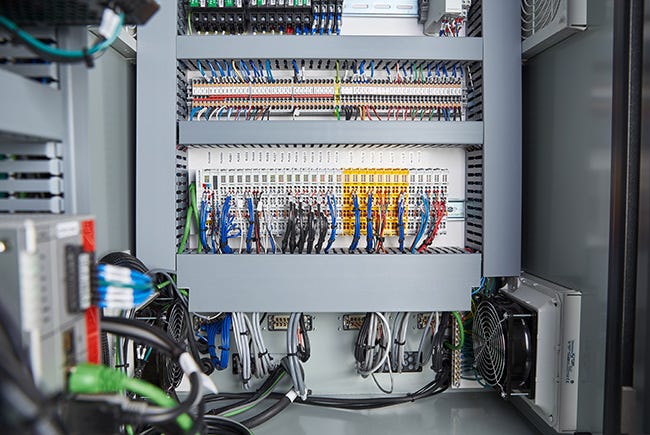Micro-Molding Machine Scales Production on Existing Automation Platform, Increasing Throughput
EtherCAT and PC-based automation helped Mold Hotrunner Solutions scale up M3 valve-gate injection-molding machines from eight to 32 cavities with high repeatability and zero waste.
October 21, 2021
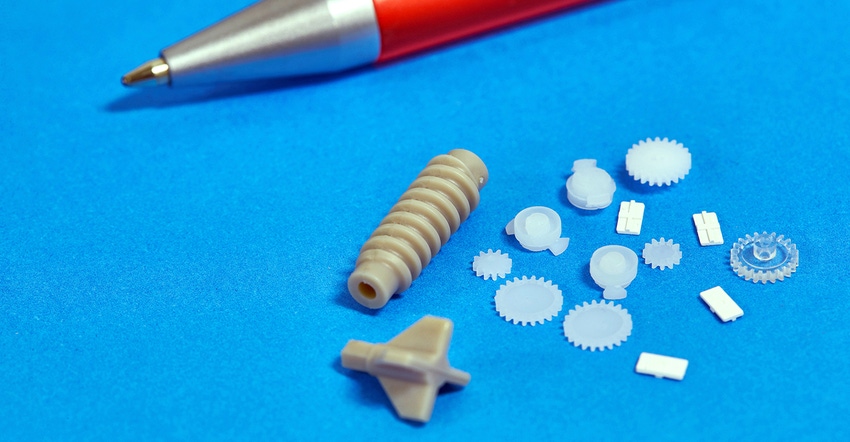
James Figy
No matter the size of the part or type of plastic, three main factors affect the quality of injection-molded products — pressure, temperature, and time. Mold Hotrunner Solutions (MHS) in Georgetown, ON, optimized these parameters for the M3 micro-molding machine when it launched in 2016. This turnkey, zero-waste injection-molding system provides new capabilities for medical device and electronics manufacturers. In-house development of systems, including Rheo-Pro hot runner nozzles and ISOKOR molding technology, enabled the M3-D08 machine to efficiently and precisely produce direct-gated micro parts as light as 1.3 milligrams.
|
With Rheo-Pro hot runner nozzles and ISOKOR technology, the M3 micro-molding machine from MHS produces direct-gated micro parts as light as 10 milligrams efficiently and with high precision. |
“We created a new injection-molding process to meet a need that other machine builders could not,” said MHS founder Harald Schmidt. “The M3 is the first injection-molding system that produces high-quality micro parts in a process that is both measurable and repeatable.” However, the company saw opportunities to increase capabilities even further. In 2020, MHS began to scale the M3 from a single module of eight micro-part cavities to four modules of eight, achieving a 32-cavity version with higher speeds. The new ALPHA M3-D32 incorporates robotics and an advanced control system to achieve higher throughput without affecting quality.
Flexible automation technologies enabled MHS to optimize the M3 and other offerings in its portfolio. MHS provides solutions for parts of all sizes for the packaging, automotive, construction, and consumer goods industries. Founded in 2002, MHS creates innovative injection-molding machines and hot-runner systems to improve productivity, part quality, and environmental impact. Based in Canada, the company maintains a global presence as part of the Westfall Technik family.
Combating quality issues with reliable processes
MHS worked to eliminate the many long-standing flaws in injection-molding processes when designing the M3. Traditionally, the process begins when plastic pellets drop from a hopper into a pipe-like barrel. A screw feeder moves the pellets forward, and heaters outside the barrel melt them. The plastic reaches the required temperature and viscosity before it arrives at the nozzle for injection into the mold. Rather than traditional injection molding, hot runners use valve gates and internal hot sprues to reduce the amount of useless plastic scrap pieces that are recycled or discarded post-molding. However, they do not eliminate scrap entirely, and only some plastics can be ground down and reused.
|
Beckhoff AL2815 and AL2412 linear servomotors provide the vertical and horizontal motion to shuffle the mold rapidly with high accuracy. |
The initial eight-cavity M3 had to ensure perfect parts would emerge every time the mold opened. The machine required coordinated horizontal and vertical motion to shuffle a 500-pound mold in a fraction of a second with an accuracy of 10 microns. These challenges made it very difficult to design a machine that simply maintains accurate pressure, temperature, and time parameters with repeatability. When the team scaled up the machine in 2020, maintaining these precision movements and hot-runner capabilities was even more critical.
Closing the gap between throughput and quality
MHS turned to Beckhoff Automation for new control solutions with the initial M3 build in 2016, and it was able to use the same control architecture to design the 32-cavity system. “Beckhoff has been working with MHS since 2012, when it required greater automation, networking, and remote access capabilities,” said Paul Pierre, Regional Sales Manager for Beckhoff Canada. The M3 achieves these goals through multiple solutions that run on a Beckhoff C6920 Industrial PC (IPC). This control cabinet IPC boasts an Intel Core i7 processor with four cores. “The C6920 IPC gives us a powerful platform to implement all needed features, which is almost impossible to achieve with tradition PLCs,” explained Amir Abbas Shoraka, Sr., Automation Engineer for MHS.
|
A Beckhoff C6920 control cabinet IPC with an Intel Core i7 processor delivered ample power to scale the M3 machine. |
The M3 features a widescreen CP3921 control panel for the HMI hardware. This 21.5-inch multi-touch display allowed MHS to reconfigure the control interface to better fit the micro-molding process. Combined with the C6920 IPC, MHS delivers an HMI with more logger variables and a smarter user interface, according to MHS Engineering Manager Kai Thielen. “The large screen offers high transparency for the user interface and for improved operator training. We developed our own features in the HMI software layout. We didn’t follow what other injection-molding machine suppliers did — we wanted something that was easier to understand and more transparent,” said Thielen.
|
MHS selected the 21.5-inch CP3921 multi-touch control panel from Beckhoff to provide operators with greater transparency and usability. |
The system openness of TwinCAT 3 automation software provided the optimal engineering platform for the M3. The open PC–based control platform communicates effectively via all IT standards and with hardware from other industrial vendors. Together with easy remote access, TwinCAT allows MHS to send logger data by email and also enables archiving in the cloud, since many end users do not want to grant network access. Most micro-molding end users prefer to store data locally, rather than connect machines to the cloud. However, a data acquisition solution was key to providing quality technical support and process improvements.
Real-time networking keeps process moving
The EtherCAT industrial Ethernet system provides real-time communication for the complex motion architecture. Because micro parts use so little plastic, maintaining the processing temperature is difficult without damaging the material. The MHS process does not heat the plastic melt to the processing temperature until just before it reaches the valve gate, which extends the working time of the plastic and reduces waste significantly.
The EL3314 four-channel thermocouple input EtherCAT terminal and TF4110 temperature control software in TwinCAT made the implementation possible. MHS used 14 heaters with tolerance requirements of ±0.1°C. The EL3314 and temperature control software gave excellent results. The Beckhoff servo drives also included AX5721 encoder interface cards to support a high-resolution Heidenhain linear encoder. For I/O and drive safety, TwinSAFE technology controls safety locks, E-stops, and safe torque-off options (STO).
|
MHS leverages a range of EtherCAT I/O terminals for temperature control, encoder interface, and functional safety via TwinSAFE, among other features. |
To manage motion requirements for the mold, AX5000 servo drives from Beckhoff power an AL2815 linear servomotor for horizontal motion and AL2412 linear servomotor for vertical motion. “It would be impossible to achieve the precision of 10 microns at a rapid pace without the real-time capabilities of EtherCAT in the I/O and drives,” Craig explained. The 32-cavity version also adds a side-entry, high-speed robot, which moves 1,000 mm at a rate of 0.4 ms into the cell and another 0.4 ms out. AX5000 drives and two AM8042 servomotors, along with an external resistor, make this possible. “This application’s complex motion control architecture required close collaboration, especially when tuning the linear axes,” Pierre added. “Working together throughout the process allowed us to create a solid relationship with the engineers at MHS.”
Creating thousands of micro parts without waste
Beckhoff technology supported the plastics industry solutions that MHS pioneered, both for the initial M3 and the scaled-up version. “PC-based automation from Beckhoff helped us achieve precision with dynamic linear motion profiles, send logs via email to prevent malfunctions, connect to the cloud, and communicate with third-party devices, such as cameras and resin dryers,” Shoraka said. Most importantly, MHS achieved accurate heater control profiles to reach and maintain the plastics’ working temperature and cyclic quality control during part injection. Especially in the ALPHA M3-D32, 62 heater controllers are working in a control platform that controls moving axes and machine operation logic in a 5-ms cycle. “In addition to robotics, the M3 offers some intelligent processing on the machine as well as a vision system for part inspection and mold safety, which is networked via EtherCAT. We did this with the same, powerful PC-based machine controller without any loss in performance.” Based on the success MHS achieved with EtherCAT, the company joined the EtherCAT Technology Group, the largest fieldbus user group with more than 6,000 members.
The original M3 machine already exceeded industry standards by producing an average of 170,000 micro parts in one working day with zero waste. If the parts weighed 10 mg, for example, it would require exactly 1 kg of plastic pellets to produce the entire run. The M3 accomplished this efficiency even with PEEK and other high-heat materials while maintaining quality standards. “Starting with the first M3 machine in 2016, the part’s prototype parameters remained identical to the processing parameters for high-volume production,” Schmidt said.
While the M3-D08 closed the quality gap for micro molding, the ALPHA M3-D32 increased this capability to an unrivaled throughput level without affecting its repeatability in terms of pressure, temperature, and time. The M3 can achieve a 4-second cycle time or better for machine motion, injection, cooling, ejection, and robotics. This brings the scaled-up machine’s per-day rate to 690,000 parts on average, more than just four times. MHS will continue innovating in this space to provide high-precision plastic products for diverse clients, working to ensure the highest speeds and quality on the micro-molding market.
|
About the author
James Figy is the Senior Content Specialist for Beckhoff Automation LLC.
You May Also Like
